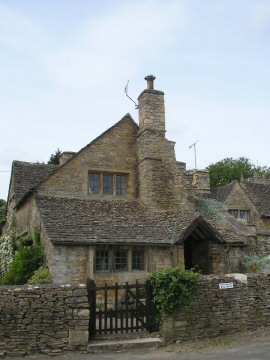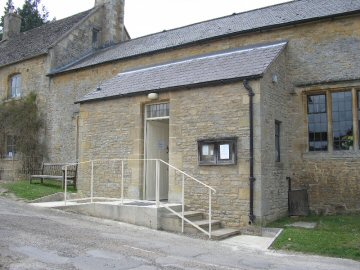Upper
Slaughter
Gloucestershire

House - Upper Slaughter
Photo - Rod Morris |
The British Serviceman's keen sense of irony has long been recognised
and no doubt the soldiers on the Western Front, knee deep in the Flanders
mire, would have given a wry smile when told that the name 'Slaughter' comes
from the Saxon word Slohtre meaning 'muddy place'. The village of Upper Slaughter
lies two miles beyond the better-known Lower Slaughter, just off the A429
trunk road between Bourton-on-the-Water and Stow-on-the Wold. This area is,
without any doubt, one of the most beautiful in England and this small Cotswold
Village remains unspoilt and uncommercialised.
Upper Slaughter sits astride a fast flowing brook, the River Eye, with a
deep ford (not suitable for motor vehicles) and two stone built footbridges.
The village square was reconstructed in 1906 under the direction of Sir Edward
Lutyens and there is a Manor House, Old School House, tiny Chapel, Village
Hall and the Parish Church of St Peter. The Parish Church dates back to Richard
The Lionheart's reign and is approached by a path bounded by steep banks
on either side. |
Literature in the Church records the fact that the village suffered no fatalities
in the Great War but the Rolls of Honour for both World Wars are to be found
proudly displayed in the Village Hall. The simple wooden board recording
the twenty-four men and one woman (Driver Agnes Witts) from the village who
fought in the Great War lists their names as:
Sapper F Alder RE
Corporal F Bateman 7th Bn Gloster Reg
Private G Beams 9th Bn Gloster Reg
Lt Col E P Brassey Coldstream Guards
Gunner C A Burtonshaw RFA
CQMS F C B Collett 7th Bn Gloster Reg
Sergeant R Griffin Cameron Highlanders
Private A E Guy 12 Bn Gloster Reg
Leading Stoker F Hazell DSM RN
Driver F H Hazell RFA
Major K M F Hedges DSO ASC
Driver J Hill RFA
Private F Jones Lanc Fusiliers
Driver F W Lockey ASC
Private J Ollett ASC
Private W J Parker Tank Corps
Private W J Tarling ASC
Private A S Winfield Ox and Bucks LI
Major E F B Witts DSO 9th Bn Gloster Reg
Captain G B Witts 14th Bn Gloster Reg
Major J T Witts MBE 3rd Bn Gloster Reg
Captain F H Witts DSO MC Irish Guards
Major F V B Witts DSO MC RE
Driver A E B Witts VAD
Private A E Woodward Devon Reg
For King and Country
A total of twenty five Service personnel enlisted from the Parish of Upper
Slaughter (six of them with the surname Witts) to fight in the First World
War and, miraculously, all twenty five of them were delivered safely back
to the tranquil beauty of this quintessentially most English of 'Thankful
Villages'. The village was able to repeat this remarkable feat twenty-five
years later when thirty-six villagers went to the Second World War and all
thirty-six returned. On return from hostilities after the Great War the Women
of the village presented the servicemen of Upper Slaughter with Certificates
of recognition as a 'small token of their appreciation and thanks for your
help towards the attainment of victory'.

The Village Hall
Photo - Rod Morris
The Village Hall in Upper Slaughter was, until just after the Great War,
a combination of reading room, washing room and stables but was leased for
99 years at a peppercorn rent by the Witts family to be constituted as a
Parish Hall 'to commemorate the ending of the Great War'. The founding document
listing those who contributed to this enterprise is still on display almost
90 years later. Also on display in this lasting legacy from the Great War
is a brass plaque of commendation from the Bourton and District regular and
Special Constabulary to the inhabitants of Upper Slaughter for their
'distinguished conduct and promptitude on the occasion of an Enemy incendiary
bomb attack on the village on 4th February 1944'. Even when the ravages of
war were brought directly to this Cotswold Village there were no fatalities.
The writer of this article would like to thank Mr Francis E B Witts for his
generous help in providing information, time and guidance in the composition
of these pages - any errors and omissions are the fault of the author himself.
Upper Slaughter has a great deal to be thankful for.
Text - Rod Morris
Return to the
"Thankful Villages" article

